Management to Improve Water Use Efficiency in Dryland Cropping
Category: Guidelines
Towards co-operative governance in the development and implementation of cross-sectoral policy: Water policy as an example
Water policy is cross-sectoral, directly and indirectly affecting and affected by almost all other sectoral policies such as agriculture, urban development, rural development, health, housing, economic development. Effective implementation of any cross-sectoral policy requires that co-operative governance processes have to be established on the ground, and not just considered as some form of laudable principle.
The use of small-scale equipment for evaluating water treatment plants
Water treatment involves the complex interaction of processes such as mixing, coagulation, flocculation, sedimentation, clarification and disinfection. Tools have been developed to simulate the full-scale water treatment plants in order to optimise and monitor the processes in terms of the chemical dosages and physical parameters.
ScoreCard V23
Municipal Scorecard for Assessing the Potential for WC/WDM Efforts in Municipalities.
Guidelines for Pressure Management
This document includes the results from eight pressure management pilot projects undertaken in South Africa, using the PRESMAC Pressure Management Program which has been developed for the South African Water Research Commission.
Guideline for reducing water losses
Many municipalities struggle to appreciate the necessity and benefits of dealing with water losses in their reticulation systems. Council officials will often debate at length over a budget allocation of a few thousand Rand when a road leak will run unattended for weeks if not months which can easily run up a bill of hundreds of thousands of Rand.
A Guide to the Control of Water Losses in Pipe Networks
Water lost from a water supply distribution network can account for a considerable percentage of the total volume of water supplied. As this loss is paid for by consumers, a reduction in the amount of water lost could lead to a decrease in water tariffs, smaller pipe sizes and reduced water purification capacity and a delay in the need for increased storage.
LITERATURE REVIEW ON PRICING AND DEBT MANAGEMENT FOR WATER SERVICES
User fees, tariffs and property rates charged by the apartheid regime, had little relevance to the marginal cost of providing them. During the 1970s and 1980s, white suburbs and industries received per capita infrastructure investments on par with or even higher than most European and North American countries through heavy government subsidies.
Water Demand Management Cookbook
A relatively simple and straightforward document aimed at providing water suppliers with some guidance on how to manage their water losses in their potable water distribution systems.
